Cisco Wireless 9174 Series Access Points Data Sheet
Available Languages
Bias-Free Language
The documentation set for this product strives to use bias-free language. For the purposes of this documentation set, bias-free is defined as language that does not imply discrimination based on age, disability, gender, racial identity, ethnic identity, sexual orientation, socioeconomic status, and intersectionality. Exceptions may be present in the documentation due to language that is hardcoded in the user interfaces of the product software, language used based on RFP documentation, or language that is used by a referenced third-party product. Learn more about how Cisco is using Inclusive Language.
Cisco Wireless Wi-Fi 7 access points bring intelligent, secure, and assured connectivity to all kinds of future-proofed workplaces.
Cisco's Wi-Fi 7 access points power the next generation of wireless experiences, designed to revolutionize connectivity and digital experiences. Offering unprecedented speeds, enhanced security, and resilient connectivity, these products are ideal for high-density environments and critical applications. They seamlessly integrate into your existing network, whether on-premises, cloud-based, or hybrid, providing flexible deployment options to suit various organizational needs.
The Cisco® Wireless Wi-Fi 7 access points enable transformative user experiences. Enterprises can leverage the predictability and low latency of Wi-Fi 7 to support better video streaming, Augmented Reality (AR), and Virtual Reality (VR) applications. By connecting people and things within physical spaces, Cisco's wireless solutions with Wi-Fi 7 offer real-time insights and actions such as indoor navigation and personalized user experiences.
Create differentiated customer experiences, accelerate digital business transformation, and prepare networks for the future with Cisco's Wi-Fi 7 solutions. With faster data transfer rates, reduced network congestion, and simplified network management with AI-driven insights and automation, the Cisco Wireless 9174 Series Access Points provide the foundation for the future of wireless.
Table 1. Features and benefits
| Feature |
Benefit |
| Wi-Fi 7 (802.11be) |
The IEEE 802.11be standard, also known as Extremely High Throughput (EHT) or Wi-Fi 7, is the latest in Wi-Fi, with enhancements such as 4K-QAM, Multilink Operation (MLO), enhanced Orthogonal Frequency-Division Multiple Access (OFDMA), and preamble puncturing support for a 320-MHz channel width built to increase data transfer rates and connection performance, especially for applications requiring low latency like AR and VR apps. |
| Wi-Fi 6E (802.11ax) |
The IEEE 802.11ax standard, also known as High-Efficiency Wireless (HEW) or Wi-Fi 6, builds on 802.11ac. It delivers a better experience in typical environments with more predictable performance for advanced applications such as 4K or 8K video; high-density, high-definition collaboration apps; all-wireless offices; and the Internet of Things (IoT). Wi-Fi 6E is Wi-Fi 6 “extended” into the 6-GHz frequency band. |
| 5G Multigigabit Ethernet |
Multigigabit Ethernet provides speeds up to 5 Gbps. Note: Cat6/Cat6A cabling is required for 10-Gbps port speeds. Cat 5e cable can support speeds up to 5 Gbps. |
| AP power optimization (AP Power Save mode) |
AP Power Save mode allows the access point to reduce its power consumption by, for example, shutting off radios during off-hours and weekends, while still being smart enough to reengage all features should they be needed. This both saves power and reduces the carbon footprint of running a wireless network. |
| Band steering |
Automatically directs Wi-Fi 6E-capable clients to connect to the 6-GHz radio to take advantage of the benefits that that radio offers while clearing the 2.4- and 5-GHz radios for legacy clients. |
| Intelligent Capture |
Probes the network and provides Cisco Catalyst™ Center with deep analysis. The software can track more than 240 anomalies and instantaneously review all packets on demand, emulating the onsite network administrator. Intelligent Capture allows for more informed decisions on your wireless networks. |
| Flexible Radio Assignment (FRA) |
Allows the access point to intelligently determine the operating mode of client serving radios based on the RF environment and traffic demands. The Cisco Wireless 9174I/E access points can be flexibly configured in tri-radio mode with 2.4 GHz, 5 GHz and 6 GHz or in dual-radio mode with 2.4 GHz and 5 GHz. |
| Bluetooth/BLE |
The integrated Bluetooth Low Energy (BLE) 5.3 radio enables location-based use cases such as asset tracking, wayfinding, and analytics. It is upgradable to BLE 6 with a future software update. |
| Application hosting |
Helps simplify IoT deployments and ready them for the future by eliminating the need to install and manage overlay networks. Using the USB interface, containerized applications and hardware modules can be deployed to reduce cost and complexity. Adding Cisco Catalyst Center provides workflows and deployment-wide application lifecycle management. |
| Container support for applications |
Enables edge computing capabilities for IoT applications on the host access point. |
| Accelerometer |
Allows continuous, post-deployment verification of how the access point is installed. |
For more details about Cisco Wireless 9174 Series feature support, see Cisco's Feature Matrix.
Introducing global use access points and Cisco Networking Subscription
Global use access points
Expanding our comprehensive Wi-Fi 7 portfolio, the 9174 Series global use access points offer a resilient, scalable solution for your modern wireless network. These access points seamlessly operate in either deployment mode, giving you the flexibility and investment protection you need for the future.
With the Cisco Wireless Wi-Fi 7 access points, you get an intelligent process for management mode discovery that's seamless, scalable, and straightforward. The global use access points’ onboarding process eliminates the need for stack-specific and regulatory domain-specific products, saving you time and effort during installation.
Cisco's Wi-Fi 7 global use access points further unify our wireless product portfolio. Whether you choose on-premises or cloud-managed networking, the 9174 Series access points help you build future-ready networks with ease.
Cisco Networking Subscription
A Cisco Networking Subscription streamlines the purchase and use of Cisco software, hardware, services, and platforms. This unified licensing model offers the flexibility to manage your network on-premises, in the cloud, or in a hybrid manner, using the same unified licenses, product support, and hardware.
You can purchase our new unified licenses (Cisco Wireless Essentials or Advantage) in a Cisco Networking Subscription. These licenses include product support for both your hardware and software. With an active subscription, you can align renewal dates to your cost-center needs, add licenses without changing renewal dates, and upgrade entitlements midterm. The Cisco Networking Subscription provides flexible management options, supporting your network investment today and protecting it for the future.
Note: For more information about the Cisco Networking Subscription, refer to the data sheet.
Secure infrastructure
Trustworthy systems built with Cisco Trust Anchor Technology provide a highly secure foundation for Cisco products. Cisco wireless access points help enable assurance of hardware and software authenticity for supply chain trust and strong defense against man-in-the-middle attacks that compromise software and firmware. Trust Anchor capabilities include:
● Image signing
● Secure Boot
● Cisco Trust Anchor module
Cisco Catalyst Center and Catalyst 9800 Series support
Pairing the Cisco Wireless 9174 Series Access Points with a Cisco Catalyst™ 9800 Series Wireless Controller and Cisco Catalyst Center allows for a total network transformation. Cisco Catalyst Center enables you to truly understand your network with real-time analytics, quickly detect and contain security threats, and easily provide networkwide consistency through automation and virtualization. The Cisco Wireless 9174 Series supports Software-Defined Access (SD-Access), Cisco’s leading enterprise architecture.
The Cisco Wireless 9174 Series Access points, combined with Cisco solutions, offer such features as:
● Cisco Spaces
● Cisco Identity Services Engine
● Cisco DNA Analytics and Assurance along with Intelligence Capture (iCAP)
Note: For information about Cisco Catalyst Center, refer to the Cisco Catalyst Center Solution Overview.
Cisco Meraki cloud management
Pairing the Cisco Wireless 9174 Series Access Points with the Cisco Meraki® cloud platform gives organizations a unified IT experience for network monitoring and management. The Meraki dashboard provides an intuitive and interactive web interface connecting your network to the industry’s leading cloud IT platform.
Through the dashboard, Meraki provides sophisticated and scalable tools to automate network optimization, deploy policy and segmentation configurations across thousands of sites and devices, and manage a full-stack network, from SD-WAN to access to IoT technologies. The platform supports over 3.5 million active networks around the world.
Working together, the Cisco Wireless 9174 Series and Meraki offer such features as:
● Cisco Spaces
● Cisco Identity Services Engine
● Meraki Health intelligent optimization and assurance
● Meraki Vision, smart cameras, and sensors
Note: For information about Cisco Meraki, refer to https://meraki.cisco.com/products/.
Table 2. CW9174E Supported Antennas and Accessories
| Product ID |
Antennas Functionality |
| CW-ANT-T-O2-D8 |
Omnidirectional ceiling mounted antenna with DART8 connector |
| CW-ANT-T-D2-D8 |
Directional patch antenna with DART8 connector, CW-MNT-ART2 mount included |
| CW-ANT-T-O4-R |
Omnidirectional dipole antenna with RP-TN connector. Requires AIR-CAB002- D8-R=- or CW-CAB-001-D8-R4. Quantity: 8 antennas per AP (2.4GHz and 5 GHz and 6 GHz mode), or 4 antennas (2.4 GHz and 5 GHz mode) |
| CW-MNT-9 |
Integrated AP mount. Integrates CW9174E and CW-ANT-T-D2-D8 into one unit |
| CW-ACC-ADPT1 |
Adapter to use CW-ANT-T-D2-D8 with C-ANT9103 mount for brown field upgrades |
| AIR-ANT2524V4C-R/RS AIR-ANT2544V4M-R/RS AIR-ANT2566P4W-R/RS AIR-ANT2566D4M-R/RS AIR-ANT2513P4M-N/NS C-ANT9101 C-ANT9102 C-ANT9103 MA-ANT-3-C6 MA-ANT-3-D6 MA-ANT-3-E6 MA-ANT-3-F6 |
Supported existing Cisco antennas. Additional connector adapters may be required. |
Cisco Wi-Fi 7 access points, including the 9174 Series, require a Cisco Networking Subscription, either Cisco Wireless Essentials or Cisco Wireless Advantage licenses.
For information about licensing features and support, refer to the Cisco Networking Subscription data sheet.
Table 3. Specifications
| Item |
Specification |
|||||||||
| Part numbers |
Cisco Wireless 9174 Series Access Points:
● CW9174I: Indoor access point with omnidirectional antenna
● CW9174E: Indoor access point with external antenna
|
|||||||||
| Software |
Cisco IOS® XE Software Release 17.18.2 or later Cisco Meraki MR32.1.5 or later |
|||||||||
| Supported wireless LAN controllers |
Catalyst and Cisco Wireless 9800 Series Wireless Controllers (physical or virtual) Catalyst 9000 switches with Embedded Wireless Controller in SD-Access mode |
|||||||||
| 802.11be |
4x4 uplink/downlink multiuser Multiple-Input Multiple Output (MU-MIMO) with four spatial streams (5 GHz, and 6 GHz), 2x2 uplink/downlink MU-MIMO with two spatial streams (2.4 GHz) (or) 4x4 uplink/downlink MU-MIMO with four spatial streams (2.4 GHz and 5 GHz) 4096 QAM Multilink operation Preamble puncturing Uplink/downlink OFDMA Target Wake Time (TWT) BSS coloring Maximal Ratio Combining (MRC) 20-, 40-, 80-, 160-, and 320-MHz channels (6 GHz) 20-, 40-, 80-, and 160-MHz channels (5 GHz) 20-MHz channels (2.4 GHz) PHY data rates up to ~17.5 Gbps (4x4 320 MHz on 6 GHz, 4x4 160 MHz on 5 GHz, and 2x2 20 MHz on 2.4 GHz) or PHY data rates up to ~6.5 Gbps (4x4 160 MHz on 5 GHz, 4x4 20 MHz on 2.4 GHz) Packet aggregation: Aggregate MAC Protocol Data Unit (A-MPDU) (transmit and receive), Aggregate MAC Service Data Unit (A-MSDU) (transmit and receive) 802.11 Dynamic Frequency Selection (DFS) Cyclic Shift Diversity (CSD) support Wi-Fi Protected Access 3 (WPA3) support |
|||||||||
| 802.11ax |
4x4 uplink/downlink MU-MIMO with four spatial streams (5 GHz, and 6 GHz), 2x2 uplink/downlink MU-MIMO with two spatial streams (2.4 GHz) (or) 4x4 uplink/downlink MU-MIMO with four spatial streams (2.4 GHz and 5 GHz) Uplink/downlink OFDMA 1024 QAM TWT BSS coloring MRC 802.11ax beamforming 20-, 40-, 80-, and 160-MHz channels (5 and 6-GHz) 20-MHz channels (2.4-GHz) PHY data rates up to ~10 Gbps (4x4 160 MHz on 6 GHz, 4x4 160 MHz on 5 GHz, and 2x2 20 MHz on 2.4 GHz) or PHY data rates up to 5.4 Gbps (4x4 160 MHz on 5 GHz, 4x4 20 MHz on 2.4 GHz) Packet aggregation: A-MPDU (transmit and receive), A-MSDU (transmit and receive) 802.11 DFS CSD support WPA2/WPA3 support |
|||||||||
| 802.11ac |
● 4x4 downlink MU-MIMO with 4x4 spatial streams
● MRC
● 802.11ac beamforming
● 20-, 40-, 80-, and 160-MHz channels
● PHY data rates up to 1.7 Gbps (4x4 160 MHz on 5 GHz)
● Packet aggregation: A-MPDU (transmit and receive), A-MSDU (transmit and receive)
● 802.11 DFS
● CSD support
● WPA2/WPA3 support
|
|||||||||
| 802.11n version 2.0 (and related) capabilities |
● 4x4 MIMO with four spatial streams
● MRC
● 802.11n and 802.11a/g beamforming
● 20- and 40-MHz channels
● PHY data rates up to 1.5 Gbps (40 MHz with 5 GHz and 20 MHz with 2.4 GHz)
● Packet aggregation: A-MPDU (transmit and receive), A-MSDU (transmit and receive)
● 802.11 DFS
● CSD support
|
|||||||||
| Integrated antenna |
Cisco Wireless 9174I
● 2.4 GHz: Peak gain 5 dBi, internal antenna, omnidirectional in azimuth
● 5 GHz: Peak gain 5 dBi, internal antenna, omnidirectional in azimuth
● 6 GHz: Peak gain 6 dBi, internal antenna, omnidirectional in azimuth
● IoT: Peak gain 4 dBi, internal antenna, omnidirectional in azimuth
|
|||||||||
| External Antenna |
Cisco Wireless 9174E
● Omni-Directional Antenna (CW-ANT-T-O2-D8)
● 2.4 GHz: Peak gain 2 dBi, omnidirectional in azimuth
● 5 GHz: Peak gain 5 dBi, omnidirectional in azimuth
● 6 GHz: Peak gain 5 dBi, omnidirectional in azimuth
● IoT: Peak gain 2 dBi, omnidirectional in azimuth
● Directional Antenna (CW-ANT-T-D2-D8)
● 2.4 GHz: Peak gain 6.6 dBi, (75x75) directional
● 5 GHz: Peak gain 5.7 dBi, (75x75) directional
● 6 GHz: Peak gain 5.7 dBi, (75x75) directional
● IoT: Peak gain 6.0 dBi, (75x75) directional
|
|||||||||
| Interfaces |
● 1x 100M/1000M/2.5G/5G Multigigabit Ethernet (RJ-45)
● Management console port (RJ-45) with default speed of 115,200 bps
● USB 2.0 at 9W
|
|||||||||
| Incorporated radios |
● Dedicated IoT radio
● dedicated tri-band scanning radio
|
|||||||||
| Indicators |
● Status LED indicates boot loader status, association status, operating status, boot loader warnings, and boot loader errors
|
|||||||||
| Dimensions |
● 9174I access point (without mounting brackets):
◦ 8.9 x 8.9 x 1.95 in. (22.6 x 22.6 x 4.9 cm)
● 9174E access point (without mounting brackets):
◦ 8.9 x 8.9 x 1.95 in . (22.6 x 22.6 x 4.9 cm) |
|||||||||
| Weight |
Cisco Wireless 9174I
● 3.36 lb. (1.52 kg)
Cisco Wireless 9174E
● 3.26 lb. (1.47 kg)
|
|||||||||
| Input power |
CW9174I |
|||||||||
| Power source |
2.4-GHz radio |
5-GHz radio |
6-GHz radio |
Link speed |
USB |
Max PoE requirement at PD |
||||
| 802.3bt (Class 5) (UPOE) or DC power |
2x2 |
4x4 |
4x4 |
1x 5G |
Y (9W) |
37W |
||||
| 802.3bt (Class 5) (UPOE) or DC power |
4x4 |
4x4 |
– |
1x 5G |
Y (9W) |
32W |
||||
| 802.3at (PoE+) |
2x2 |
4x4 |
4x4 |
1x 2.5G |
Y (2.5W) |
25.5W |
||||
| 802.3at (PoE+) |
4x4 |
4x4 |
– |
1x 2.5G |
Y (2.5W) |
25.5W |
||||
| 802.3af (PoE) |
1x1 |
– |
– |
1x 1G |
N |
13.95W |
||||
| CW9174E |
||||||||||
| Power source |
2.4-GHz radio |
5-GHz radio |
6-GHz radio |
Link speed |
USB |
Max PoE requirement at PD |
||||
| 802.3bt (Class 5) (UPOE) or DC power |
2x2 |
4x4 |
4x4 |
1x 5G |
Y (9W) |
37W |
||||
| 802.3bt (Class 5) (UPOE) or DC power |
4x4 |
4x4 |
– |
1x 5G |
Y (9W) |
32W |
||||
| 802.3at (PoE+) |
2x2 |
4x4 |
4x4 |
1x 2.5G |
Y (2.5W) |
25.5W |
||||
| 802.3at (PoE+) |
4x4 |
4x4 |
– |
1x 2.5G |
Y (2.5W) |
25.5W |
||||
| 802.3af (PoE) |
1x1 |
– |
– |
1x 1G |
N |
13.95W |
||||
| Power consumption |
CW9174I |
|||||||||
| Power source |
Idle |
Typical |
||||||||
| 802.3bt (UPOE) |
12.4W ± 2W |
20.6W ± 4W |
||||||||
| 802.3at (PoE+) |
12.4W ± 2W |
18.2W ± 4W |
||||||||
| Note: Actual power consumption may vary depending on access point usage. Typical power consumption assumes the access point is passing traffic* during typical business hours and is idle during off-business hours. Business hours are assumed to be 11 hours a day, 6 days a week.
*
Test conditions:
802.3bt: The 6-GHz, 5-GHz band all operating at 160 MHz (4x4) passing 1 Gbps per band of download traffic and the 2.4-GHz band operating at 20 MHz (4x4) passing 150 Mbps of download traffic; USB disabled; 10G Ethernet port; ambient temperature 25˚C (77°F). 802.3at: The 6-GHz and 5-GHz bands both operating at 160 MHz (2x2) passing 200 Mbps per band of download traffic and the 2.4-GHz band operating at 20 MHz (2x2) passing 50 Mbps of download traffic; USB disabled; 2.5G Ethernet port; ambient temperature 25˚C (77°F). |
||||||||||
| CW9174E |
||||||||||
| Power source |
Idle |
Typical |
||||||||
| 802.3bt (UPOE) |
12.4W ± 2W |
20.6W ± 4W |
||||||||
| 802.3at (PoE+) |
12.4W ± 2W |
18.2W ± 4W |
||||||||
| Note: Actual power consumption may vary depending on access point usage. Typical power consumption assumes the access point is passing traffic* during typical business hours and is idle during off-business hours. Business hours are assumed to be 11 hours a day, 6 days a week.
*
Test conditions:
802.3bt: The 6-GHz, 5-GHz band all operating at 160 MHz (4x4) passing 1 Gbps per band of download traffic and the 2.4-GHz band operating at 20 MHz (4x4) passing 150 Mbps of download traffic; USB disabled; 10G Ethernet port; ambient temperature 25˚C (77°F). 802.3at: The 6-GHz and 5-GHz bands both operating at 160 MHz (2x2) passing 200 Mbps per band of download traffic and the 2.4-GHz band operating at 20 MHz (2x2) passing 50 Mbps of download traffic; USB disabled; 10G Ethernet port; ambient temperature 25˚C (77°F). |
||||||||||
| Environmental |
Cisco Wireless 9174I
● Nonoperating (storage) temperature: -22° to 158°F (-30° to 70°C)
● Nonoperating (storage) altitude test: 25°C (77°F) at 15,000 ft (4570 m)
● Operating temperature: 32° to 122°F (0° to 50°C)
● Operating humidity: 10% to 90% (noncondensing)
● Operating altitude test: 40°C (104°F) at 9843 ft (3000 m)
Cisco Wireless 9174E
● Nonoperating (storage) temperature: -22° to 158°F (-30° to 70°C)
● Nonoperating (storage) altitude test: 25°C (77°F) at 15,000 ft (4570 m)
● Operating temperature: -4° to 122°F (-20° to 50°C)
● Operating humidity: 10% to 90% (noncondensing)
● Operating altitude test: 40°C (104°F) at 9843 ft (3000 m)
|
|||||||||
| System memory |
● 4096 MB DRAM
● 16 GB storage flash
|
|||||||||
| Available transmit power settings |
Cisco Wireless 9174I |
|||||||||
| 2.4 GHz |
5 GHz |
6 GHz |
||||||||
| 4x4:
● 23 dBm (200 mW)
● -4 dBm (0.39 mW)
2x2:
● 20 dBm (100 mW)
● -4 dBm (0.39 mW)
|
● 23 dBm (200 mW)
● -4 dBm (0.39 mW)
|
● 23 dBm (200 mW)
● -4 dBm (0.39 mW)
Note: In countries where use of the 6-GHz band is not allowed or there is no current software support, the 6-GHz radio will be disabled. The radio may be enabled with future software once the product is certified to operate in 6 GHz for that country. |
||||||||
| Cisco Wireless 9174E |
||||||||||
| 2.4 GHz |
5 GHz |
6 GHz |
||||||||
| 4x4:
● 23 dBm (200 mW)
● -4 dBm (0.39 mW)
2x2:
● 20 dBm (100 mW)
● -4 dBm (0.39 mW)
|
● 23 dBm (200 mW)
● -4 dBm (0.39 mW)
|
● 23 dBm (200 mW)
● -4 dBm (0.39 mW)
Note: In countries where use of the 6-GHz band is not allowed or there is no current software support, the 6-GHz radio will be disabled. The radio may be enabled with future software once the product is certified to operate in 6 GHz for that country. |
||||||||
| Compliance standards |
●
Safety:
◦ IEC 60950-1 / IEC 62368-1 Ed.3 (with Ed.2 Deviation annex) ◦ EN 60950-1 / EN 62368-1 Ed.3 (with Ed.2 Deviation annex) ◦ UL 60950-1 / UL62368-1 3rd (with Ed.2 Deviation annex) ◦ CAN/CSA-C22.2 No. 60950-1 / CAN/CSA-C22.2 No. 62368-1 3rd (with Ed.2 Deviation annex) ◦ AS/NZS60950.1 / AS/NZS62368.1 Ed.3 (with Ed.2 Deviation annex) ◦ UL 2043 ◦ Class III equipment
●
Emissions:
◦ CISPR 32 (rev. 2015) +AMD1:2019 ◦ EN 55032:2015/A11:2020 ◦ EN IEC 61000-3-2:2019/A1:2021 ◦ EN 61000-3-3:2013+A1:2019 ◦ AS/NZS CISPR32: 2015+AMD1:2020 ◦ 47 CFR FCC Part 15B ◦ ICES-003 (Issue 7, Class B) ◦ VCCI-CISPR 32:2016 ◦ CNS 13438:2006 (95) ◦ KS C 9832:2019 ◦ QCVN 118:2018/BTTTT
●
Immunity:
◦ EN 55035:2017+A11:2020 ◦ KS C 9835:2019
●
Emissions and immunity:
◦ EN 301 489-1 V2.2.3 (2019-11) ◦ EN 301 489-17 V3.2.4 (2020-09) ◦ QCVN (18:2014) ◦ QCVN 112:2017/BTTTT ◦ KS X 3124:2020 ◦ KS X 3126:2020 ◦ EN 61000-6-1:2019 ◦ EN 60601-1-2:2015+A1:2021 |
●
Radio:
◦ EN 300 328 (v2.2.2) ◦ EN 301 893 (v2.1.1) ◦ EN 303 687 (v0.0.14, draft) ◦ AS/NZS 4268 (rev. 2017) ◦ 47 CFR FCC Part 15C, 15.247, 15.407 ◦ RSP-100 ◦ RSS-GEN ◦ RSS-247 ◦ LP0002 (109) ◦ Japan Std. 66, and Std. 71
●
RF safety:
◦ EN 50385:2017 ◦ AS/NZS 2772 (rev. 2016) ◦ 47 CFR Part 2.1091 ◦ RSS-102 ◦ IEEE standards: ◦ IEEE 802.3 ◦ IEEE 802.3ab ◦ IEEE 802.3af/at ◦ IEEE 802.11a/b/g/n/ac/ax/be ◦ IEEE 802.11h, 802.11d
●
Security:
◦ 802.11i (WPA2, WPA3) ◦ 802.1x/802.1x - SHA256 ◦ Enhanced Open/OWE ◦ Advanced Encryption Standard (AES) - GCMP128, GCMP256 and CCMP256
●
Extensible Authentication Protocol (EAP) types:
◦ EAP-Transport Layer Security (TLS) ◦ EAP-Tunneled TLS (TTLS) or Microsoft Challenge Handshake Authentication Protocol (MSCHAP) v2 ◦ Protected EAP (PEAP) v0 or EAP-MSCHAP v2 ◦ EAP-Flexible Authentication via Secure Tunneling (EAP-FAST) ◦ PEAP v1 or EAP-Generic Token Card (GTC) ◦ EAP-Subscriber Identity Module (SIM) |
||||||||
| Certifications |
●
Wi-Fi Alliance: Wi-Fi 7 (R1), Wi-Fi 6 (R2), Wi-Fi 6E, WPA3-R3, WPA3-Suite B, Enhanced Open Security
●
Bluetooth SIG: Bluetooth Low Energy
|
|||||||||
CW9174I patterns
CW9174I 2.4 GHz Client Serving Radio (2x2)

CW9174I 2.4 GHz Client Serving Radio (4x4)

CW9174I 5 GHz Client Serving Radio

CW9174I 6 GHz Client Serving Radio

CW9174I 2.4 GHz Scanning Radio

CW9174I 5 GHz Scanning Radio

CW9174I 6 GHz Scanning Radio

CW9174I 2.4 GHz IoT Radio
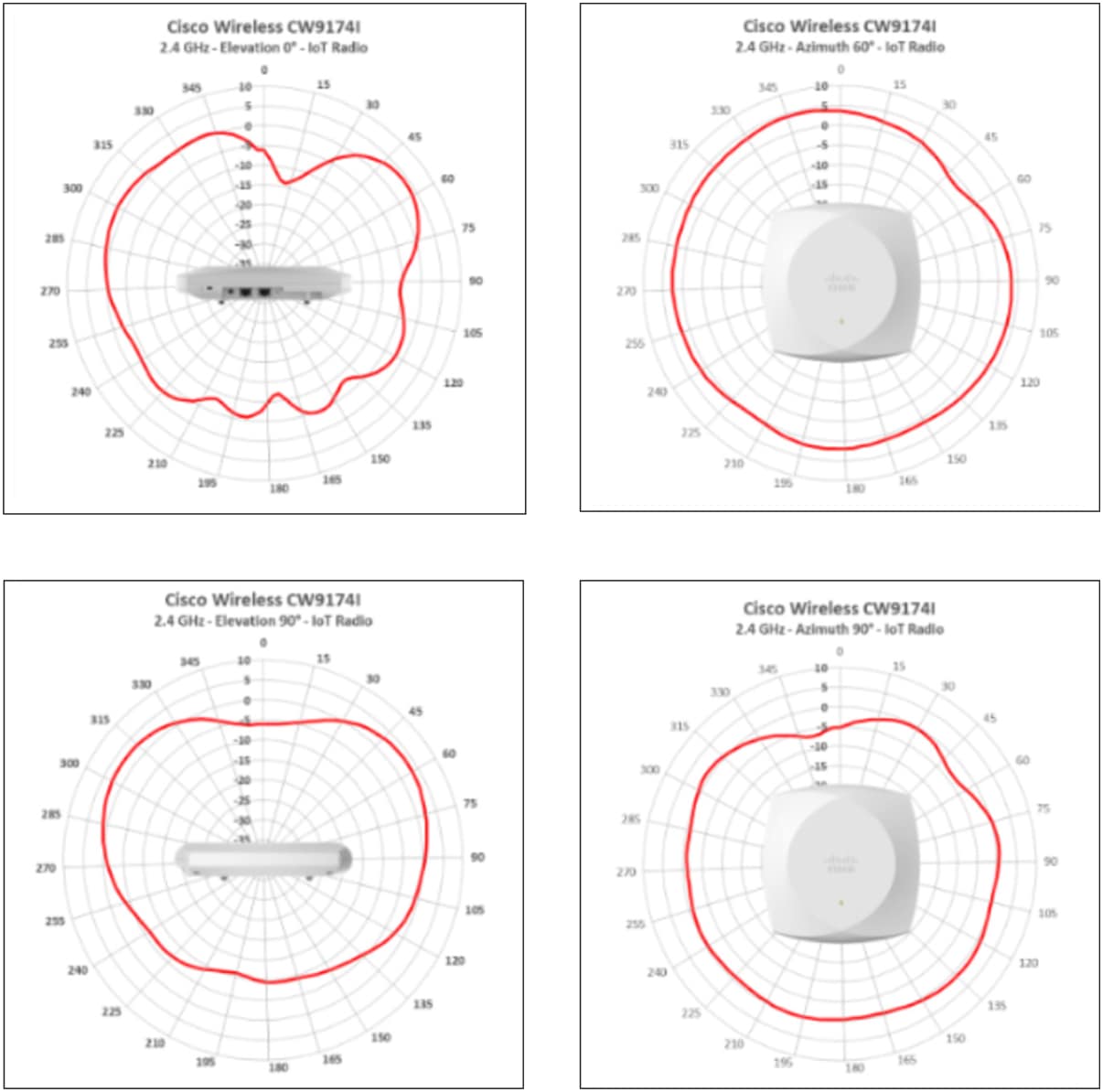
CW9174E patterns
CW-ANT-T-O2-D8, Omnidirectional Antenna 2.4 GHz Client Serving Radio (2x2)

CW-ANT-T-O2-D8, Omnidirectional Antenna 2.4 GHz Client Serving Radio (4x4)

CW-ANT-T-O2-D8, Omnidirectional Antenna 5 GHz Client Serving Radio

CW-ANT-T-O2-D8, Omnidirectional Antenna 6 GHz Client Serving Radio

CW-ANT-T-O2-D8, Omnidirectional Antenna 2.4GHz IoT Radio
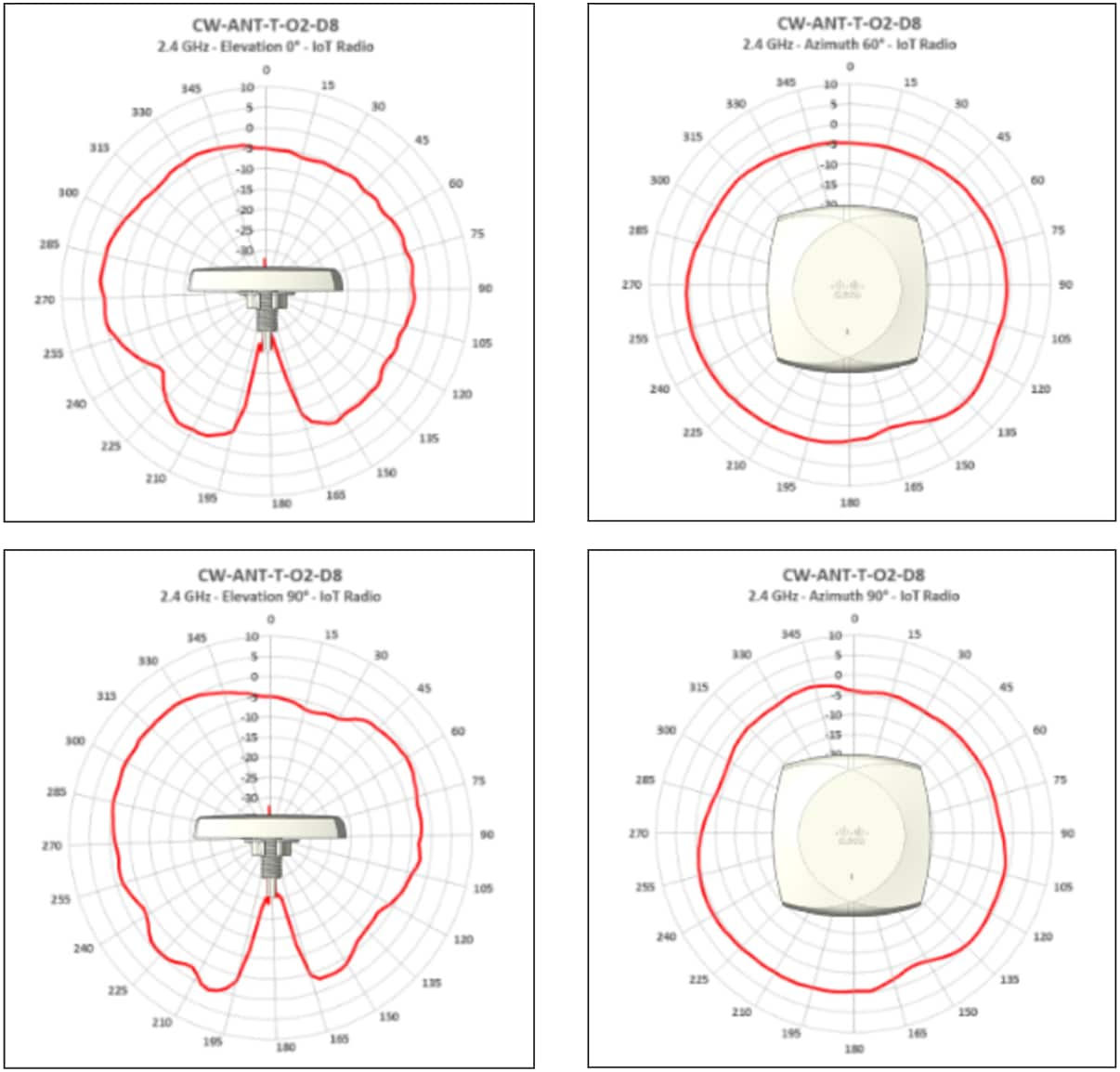
CW-ANT-T-D2-D8, Directional Antenna 2.4 GHz Client Serving Radio (4x4)
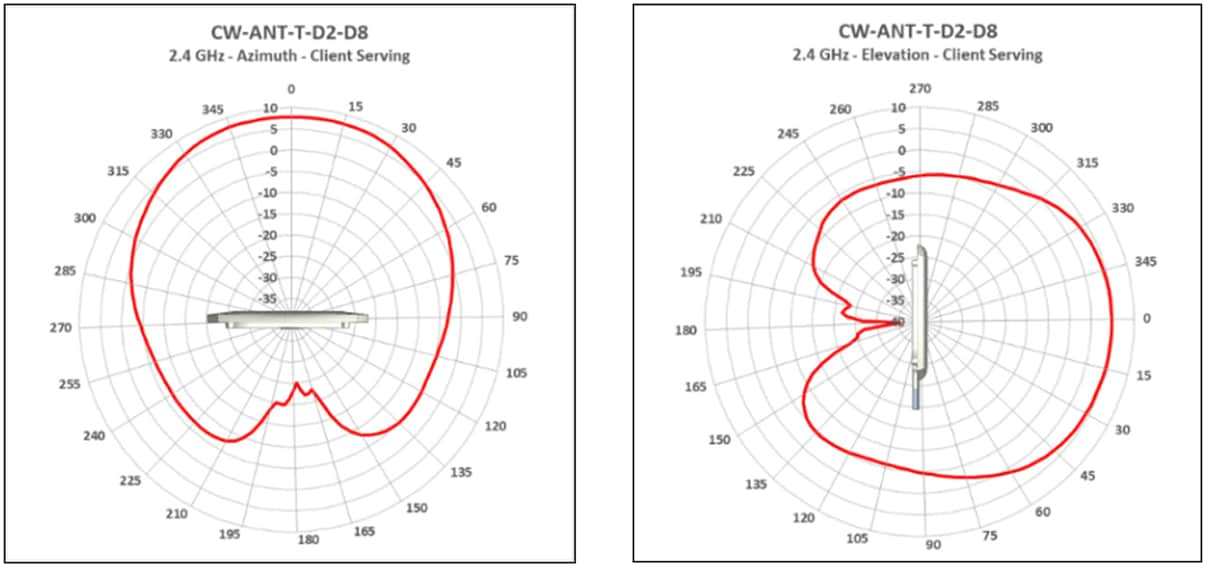
CW-ANT-T-D2-D8, Directional Antenna 2.4 GHz Client Serving Radio (2x2)
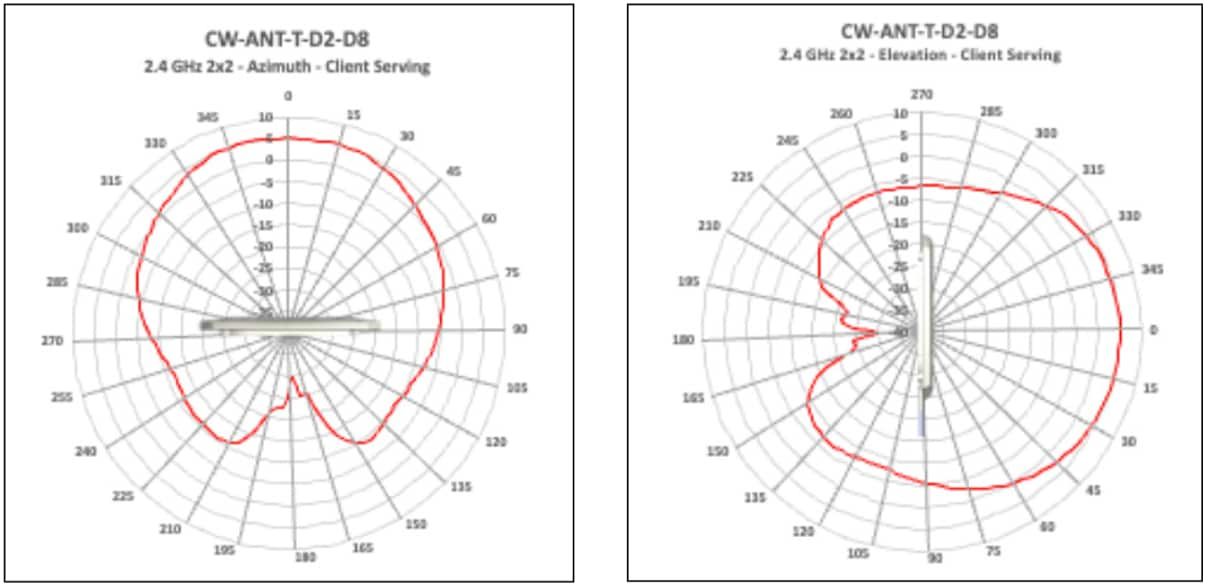
CW-ANT-T-D2-D8, Directional Antenna 5 GHz Client Serving Radio
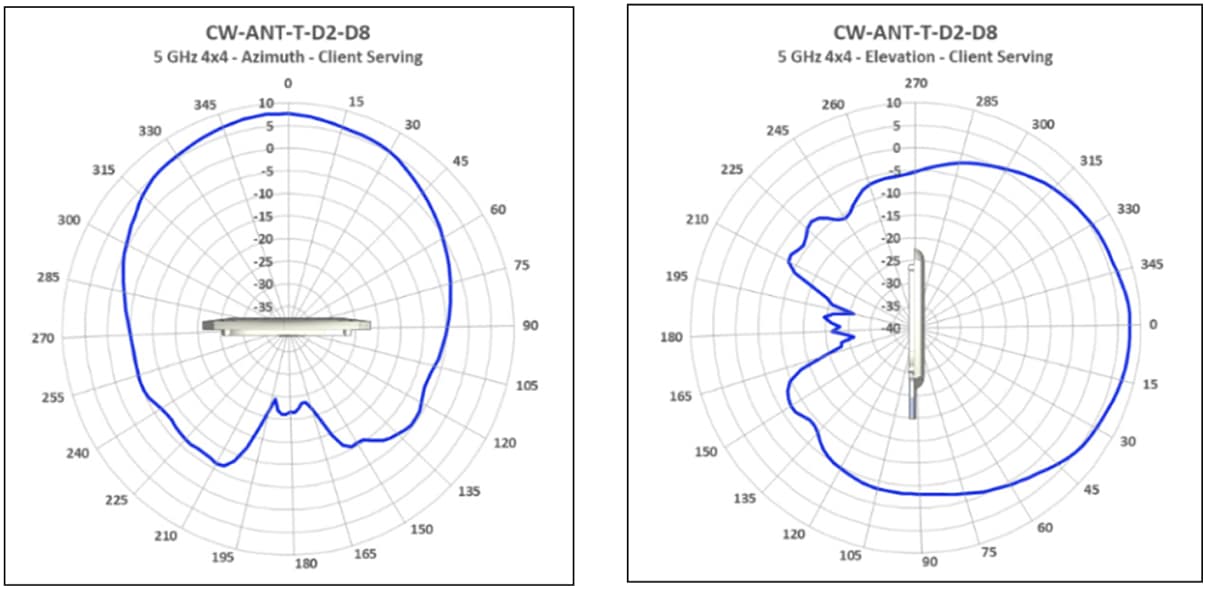
CW-ANT-T-D2-D8, Directional Antenna 6 GHz Client Serving Radio
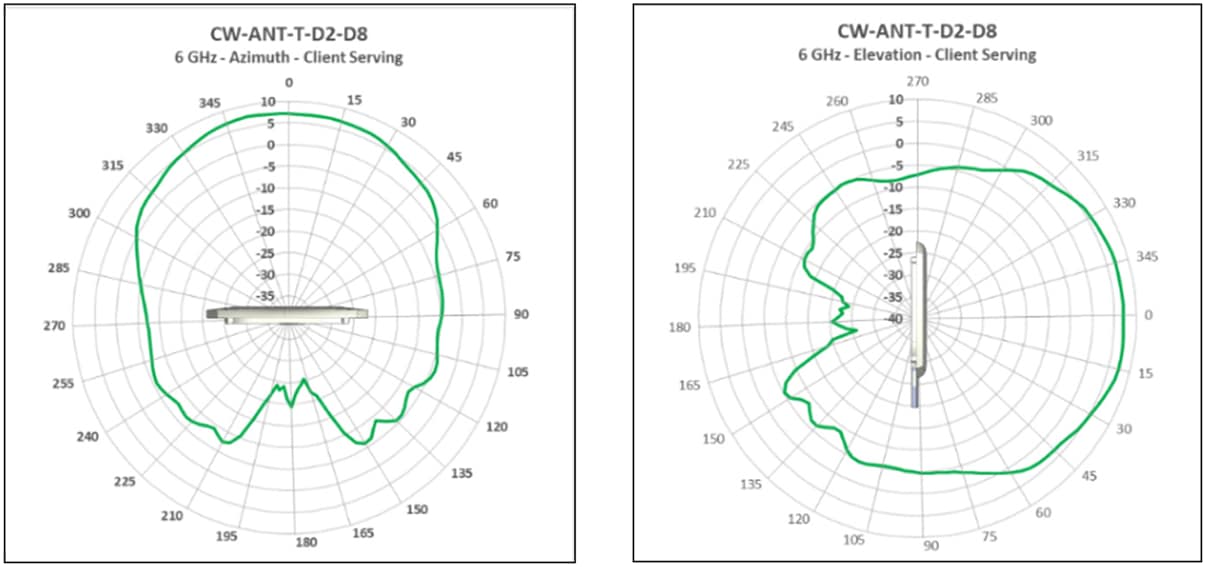
CW-ANT-T-D2-D8, Directional Antenna 6 GHz Client Serving Radio
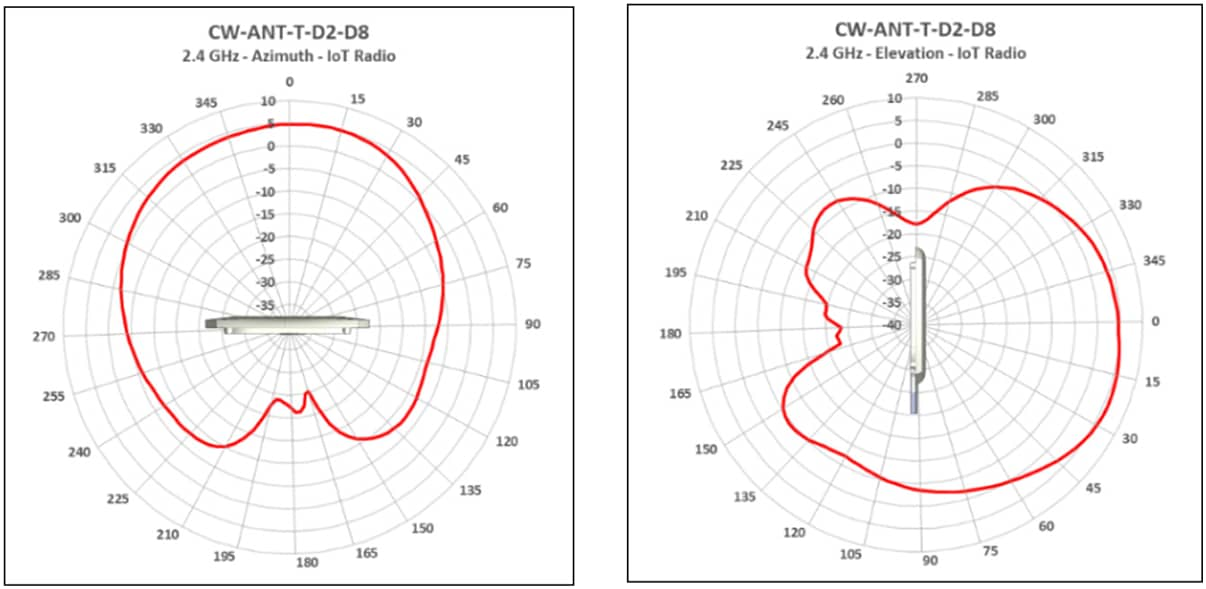
The Cisco Wireless 9174 Series Access Points are available. To order, please visit the Cisco Ordering homepage or the Cisco Wireless Ordering Guide.
For additional product numbers, please check the Cisco Wi-Fi 7 products price list or contact your local Cisco account representative.
The Cisco Wireless 9174 Series Access Points come with a limited lifetime warranty that provides full warranty coverage of the hardware for as long as the original end user continues to own or use the product. The warranty includes 5-day advance hardware replacement and helps ensure that software media are defect-free for 90 days. For more details, visit https://www.cisco.com/go/warranty.
Cisco is embedding sustainability into the product lifecycle, from manufacturing to end of use. Designed with consideration for Cisco’s Circular Design Principles, our products feature both individual and portfolio-wide programs and innovations, including those that address efficient architecture design, power consumption, energy management, packaging sustainability, and takeback. These elements are pivotal in reducing operational costs and advancing net-zero greenhouse gas (GHG) emissions targets and other sustainability-related ambitions.
Information about Cisco’s Environmental, Social and Governance (ESG) initiatives and performance is available in Cisco’s Purpose Reporting Hub.
Table 4. Cisco environmental sustainability information
| Sustainability Topic |
Reference |
|
| Power |
Power consumption |
Typical and idle power consumption of standalone access points. |
| Energy management |
Energy management dashboard |
The Catalyst Center Dashboard offers comprehensive energy management capabilities, allowing users to monitor power usage, energy mix, costs, and CO2e emissions and optimize energy consumption in real-time. |
| AP Power Save mode |
AP Power Save mode allows user to disable certain features to reduce power consumption during off-business hours or redistribute power to important features in degraded PoE mode. |
|
| Port scheduling |
Port schedules allow users to turn off Power over Ethernet (PoE) power to access points on a custom schedule to reduce power consumption during off-business hours. |
|
| Materials, modularity, and reuse |
Hardware modularity |
Access point brackets can be reused from legacy Cisco access points, reducing waste and simplifying upgrades. |
| Efficient access point architecture |
Replaces diodes with Field-Effect Transistors (FETs), reducing power loss. |
|
| Cisco Takeback and Reuse program |
Allows customers to return used equipment for responsible recycling and reuse. |
|
| Cisco Refresh |
Offers certified remanufactured products, providing cost-effective alternatives to new equipment. Cisco Refresh |
|
| Packaging |
Elimination of single-use plastic |
Plastic bags for accessories have been replaced with paper packaging. |
| Fiber-based packaging |
Foam is replaced with a recyclable fiber-based solution. |
|
| Recycled content |
Corrugated materials contain recycled content. |
|
| Accessory opt-out |
Customer can choose to opt out of the default accessories. |
|
| Multipack |
Multipack packaging option for Catalyst and Meraki customers. Reduces the amount of packaging, simplifying large deployments and reducing shipping weight, costs, and carbon footprint. |
|
| Regulatory compliance |
Environmental compliance |
Information regarding Cisco’s compliance with applicable environmental laws and regulations is available at the “Environmental Compliance” section of Cisco´s Purpose Reporting Hub. Environmental Compliance |
| Product Approvals Status (PAS) database |
Information regarding the certification status for given Cisco products in certain countries is available at Cisco´s self-service PAS (Product Approvals Status) database. |
|
| Product-related materials compliance |
Cisco’s position regarding relevant product-related materials legislation (e.g., Restriction of Hazardous Substances [RoHS] and Registration, Evaluation, Authorization, and Restriction of Chemicals [REACH]) is available. |
|
| Waste Electrical and Electronic Equipment (WEEE), battery, and packaging compliance |
Cisco’s position regarding relevant product-related recycling, battery, and packaging legislation is available. WEEE, Battery & Packaging |
|
| Cisco packaging materials and codes |
Packaging material identification for packaging used for Cisco products is available. |
|
| General |
Sustainability inquiries |
Contact this alias for questions and information related to Cisco’s general and product-specific sustainability initiatives. |
| Cisco policies, positions, and guides |
Links to select Cisco environmental sustainability policies, positions, and guides are provided on the “Policies, Positions, and Guides” section of Cisco´s Purpose Reporting Hub. |
|
| Cisco Green Pay |
Cisco Green Pay is a financing program aimed at promoting more sustainable technology adoption by providing flexible payment options. |
|
With Cisco Services, you can achieve infrastructure excellence faster with less risk. From an initial WLAN readiness assessment to implementation, full solution support, and in-depth training, our services for the Cisco Wireless 9174 Series provide expert guidance to help you successfully plan, deploy, manage, and support your new access points. With unmatched networking expertise, best practices, and innovative tools, Cisco Services can help you reduce overall upgrade, refresh, and migration costs as you introduce new hardware, software, and protocols into the network. With a comprehensive lifecycle of services, Cisco experts will help you minimize disruption and improve operational efficiency to extract maximum value from your Cisco infrastructure. For more information, please visit https://www.cisco.com/go/services.
Flexible payment solutions to help you achieve your objectives
Cisco Capital makes it easier to get the right technology to achieve your objectives, enable business transformation and help you stay competitive. We can help you reduce the total cost of ownership, conserve capital, and accelerate growth. In more than 100 countries, our flexible payment solutions can help you acquire hardware, software, services and complementary third-party equipment in easy, predictable payments. Learn more.